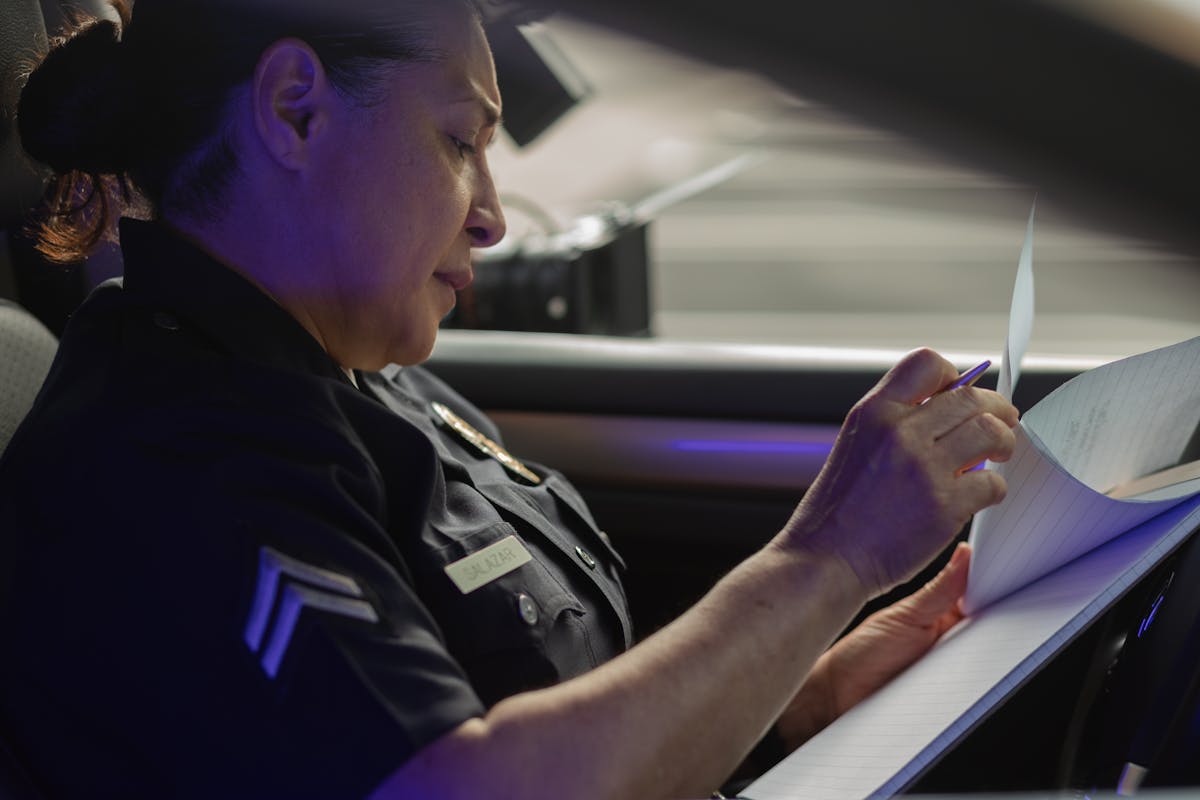
When you need to serve court papers, one common question that comes up is: Can a police officer serve court papers? While the idea of involving law enforcement might seem logical, the process of serving legal documents must follow specific rules to ensure your case moves forward properly.
Delivering court documents is a vital part of the legal process, and this article will answer your questions about whether a police officer can serve court papers and explain the options available to you.
Serving Court Papers 101: What It Really Means and Why It Matters
Serving court papers refers to the recognized delivery of court documents to a person or organization named in a legal proceeding. This step ensures that the recipient is properly informed of any legal action and has a fair opportunity to respond. Common documents that require service include summons, complaints, subpoenas, and notices.
At this stage, many people ask, “Can a police officer serve court papers?” Knowing who is legally authorized to serve these documents is crucial to prevent potential delays or issues in your case.
Understanding the Legal Importance of Proper Service
Serving court papers isn’t just a procedural formality—it’s a legal requirement that ensures the defendant or recipient is officially notified of a case. Improper service can lead to major setbacks, including delays, dismissed cases, or judgments being overturned.
Courts rely on valid service to confirm that all parties have received fair notice. Without it, due process could be compromised, making this step one of the most critical parts of any legal action.
The Truth About Police Officers Serving Court Papers
Generally, police officers are not responsible for serving court papers. In most jurisdictions, police officers are involved in law enforcement and crime prevention, not in delivering legal documents. Serving court papers typically falls under the responsibilities of professional process servers, who are trained in providing documents according to legal requirements.
However, there are some exceptions. In rare cases, police officers may be allowed to serve papers under specific circumstances, such as in criminal cases. If law enforcement is already involved in a case, they may be authorized to serve certain types of documents, especially when they relate to criminal matters.
Can I Have a Police Officer Serve Court Papers? Exploring Your Legal Options
While police officers are not typically used to serve court papers, you may still wonder if it’s an option. In general, you cannot choose to have a police officer serve court papers in most cases. Process servers are your go-to professionals for regular civil cases. They are experienced in the proper procedures to ensure service is completed according to the law.
However, in some cases, especially in criminal matters or special circumstances, a police officer may be able to serve papers. For instance, if a person is already being arrested or detained, the officer may be authorized to serve documents related to the case.
Can You Have a Police Officer Serve Court Papers in California? The Facts You Shouldn’t Overlook

In California, the rules for serving court papers are similar to those in other states. Police officers generally do not serve civil papers, and you must hire a licensed process server to complete this task.
California law allows certain types of documents to be served by someone other than a professional process server, including law enforcement officers, under certain conditions. For instance, a police officer may serve papers in a criminal case or when a person is in custody.
This raises the question: can a police officer serve court papers in other situations? However, for most civil cases, it’s important to use a professional service to ensure that all legal procedures are followed.
Why Can’t a Police Officer Serve Court Papers in Most Cases?
Many people wonder, “Can a police officer serve court papers?” While it may seem like a practical option, there are several reasons why law enforcement officers typically do not handle this task. First, their primary focus is on public safety and criminal investigations—not the delivery of legal documents in civil matters. Their duties are centered on maintaining order and enforcing the law, not on serving paperwork.
Second, serving court papers requires a specialized skill set. Professional process servers are trained to deliver legal documents in strict compliance with legal standards. They understand how to verify the recipient’s identity and provide valid proof of service, which is essential for the legal process to move forward without delays or disputes.
Who Can Serve Court Papers?
There are several options when it comes to serving court papers:
- Licensed Process Servers: These professionals are trained to deliver legal documents lawfully and efficiently and are commonly hired to serve papers in civil legal matters.
- Sheriffs or Marshals: In some cases, a sheriff or marshal may be used to serve court papers. They are law enforcement officers who have the authority to serve documents within their jurisdiction.
- Private Individuals: In some cases, a non-involved third party who is over the age of 18 and not a party to the case can serve court papers.
What to Consider Before Choosing Who Serves Your Papers
Serving legal documents isn’t just about handing over papers. It involves rules, timing, and proper handling. Choosing the right person can prevent delays or legal issues. Here’s what to keep in mind:
- Rules must be followed: Courts require that service is done a certain way. If not, the case can be delayed or thrown out.
- Timing matters: Deadlines are strict. Late or incorrect delivery can affect your case.
- Some people avoid being served: A trained server knows how to deal with evasive behavior.
- Professionalism is key: Handling emotional or tense situations requires experience.
- Proof of service is required: Courts need clear evidence that documents were delivered correctly.
Taking shortcuts or guessing through the process can lead to costly mistakes. The right person will know how to serve documents legally, safely, and with the proper documentation.
Legal Paperwork That Typically Requires Service
Different types of legal documents require formal service, depending on the nature of the case. Here’s a helpful breakdown:
Document Type | Purpose |
Summons | Notify the defendant they are being sued |
Complaint | Details of the plaintiff’s claims |
Subpoena | Commands someone to testify or provide evidence |
Notice of Hearing | Informs involved parties of upcoming court dates |
Temporary Restraining Order (TRO) | Enforces immediate restrictions on a person or activity |
Each of these must be served following state-specific rules to be legally valid.
Alternatives for Serving Court Papers

While a police officer may not always be able to serve court papers, there are other alternatives:
- By Mail: Some court documents can be served by mail, though there are specific rules to follow to ensure they are done properly.
- Personal Service: Having someone personally deliver the papers to the defendant is often the best way to ensure that the service is legal.
- Substitute Service: In cases where the defendant cannot be personally served, documents may be left with someone at their residence or business.
- Service by Publication: If the person cannot be located, you may be able to serve them by publishing a notice in a local newspaper.
Service Challenges: What If the Person Avoids Service?
Some defendants may try to dodge service, but the legal system accounts for that.
Options if someone avoids service:
- Stakeouts by professional servers
- Substitute service after multiple attempts
- Service by publication (court-approved legal notice in a newspaper)
- Motion for alternative service (requesting permission to serve by email or social media in rare cases)
These require documentation and often court approval, which process servers are equipped to handle.
Why DIY Service Can Be Risky
Trying to serve papers yourself or having a friend do it might seem like a cost-saving option, but it comes with risks:
- Lack of legal knowledge: Incorrect service could result in rejection by the court.
- Personal involvement: Serving someone you’re suing can escalate tensions.
- Proof issues: You need valid proof of service, which is often overlooked in DIY situations.
What a Professional Process Server Does Differently
Hiring a licensed process server ensures that:
- Service is completed following state and court rules
Attempts are properly documented. - Alternative methods (substitute or service by publication) are used if needed.
- Proof of service is provided and filed appropriately
These professionals are also skilled in locating hard-to-find individuals (skip tracing), ensuring service even when someone is avoiding contact.
What Happens If Court Papers Aren’t Served Properly?
If court papers aren’t served correctly, it can delay your case. Improper service means the defendant might not know about the legal proceedings, which can result in a dismissal of your case or a delay in the legal process. To avoid complications, it’s important to make sure the service of court papers is done accurately and legally.
How to Ensure Court Papers Are Served Correctly
To ensure that your court papers are served properly, follow these steps:
- Get a Skilled Process Server: A process server has the experience and knowledge to ensure that service is done in compliance with the law.
- Use the Right Service Method: Depending on your case and jurisdiction, choose the most appropriate method of service, whether it’s personal service, mail, or another method.
- Keep Documentation: Be sure to get proof of service, such as an affidavit or certificate, to show that the documents were delivered correctly.
Process Serving in California: Key Legal Requirements

California law requires that the service of process follow very specific guidelines. Some key points:
- Must be at least 18 years old and not a party to the case
- Service must be completed within a certain time frame
- Proof of service must be filed with the court
- Substitute service (leaving papers with another adult at the residence or workplace) is only valid under certain conditions
Professional process servers in California are well-versed in these rules and are trained to avoid mistakes that could affect your case.
Serving Papers the Right Way: When to Skip the Police and Hire a Pro
In most cases, a police officer cannot serve court papers. While they may be able to serve documents in specific criminal situations or when they are already involved in a case, they are not generally tasked with serving legal papers in civil matters.
The best way to ensure your court papers are served correctly is by hiring a professional process server who is trained in the legal requirements of service.
If you are unsure of how to proceed, think about contacting a professional service provider who can guide you through the process and ensure that your legal documents are served appropriately. Proper service of court papers is essential for moving forward with your case, so take the necessary steps to make sure it’s done right.
If you need help serving court papers, consider reaching out to a professional process server. With the right assistance, you can ensure your legal documents are served properly and your case moves forward smoothly.







